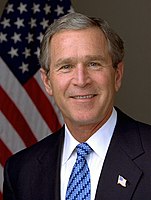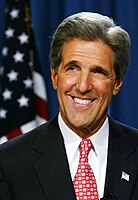| ||||||||||||||||||||||||||
| ||||||||||||||||||||||||||
 County Results
| ||||||||||||||||||||||||||
| ||||||||||||||||||||||||||
| Elections in Iowa |
|---|
 |
The 2004 United States presidential election in Iowa took place on November 2, 2004, as part of the 2004 United States presidential election in which all 50 states plus the District of Columbia participated. Voters chose seven electors to represent them in the Electoral College via a popular vote pitting incumbent Republican President George W. Bush and his running mate, Vice President Dick Cheney, against Democratic challenger and Senator from Massachusetts John F. Kerry and his running mate, Senator from North Carolina John Edwards. Six third parties were also on the ballot.
Iowa was won by President George W. Bush by a 0.67% margin of victory, or 10,059 votes, despite losing the state to Al Gore four years earlier. Prior to the election, most news organizations considered this a swing state. The Democrats had won Iowa in the previous four presidential elections, though only narrowly in 2000. Gore had won the state by only 0.32 percentage points, or 4,144 votes, a much weaker margin compared to the prior three elections. In 1988, Democrat Michael Dukakis won the state by 10.21% even in an otherwise Republican landslide year, and Bill Clinton carried the state by 6.02% in 1992 and 10.34% in 1996. Iowa was one of just two states, along with New Mexico, to vote for Gore in 2000 but flip to Bush in 2004, although it was won both times by narrow margins. Iowa was one of two states to be won by George W. Bush in at least one of his presidential runs that his father George H. W. Bush never carried, the other being West Virginia.
Bush became the first Republican to win Iowa since Ronald Reagan had done so in 1984. As of the 2020 presidential election, this is the last time a Republican won Iowa by only a plurality. Until 2020, this was the last time Iowa did not vote for the same candidate as neighboring Wisconsin. This election marked a new streak of Iowa voting for the winning ticket in every election along with Florida and Ohio until 2020, when all three voted for the losing candidate. With Iowa, Florida, and Ohio's winning streaks no longer being intact, Wisconsin, Michigan, and Pennsylvania are now all tied for the longest streaks of siding with the winner, all three of which most recently failing to do so when they backed Kerry during his losing presidential bid in 2004.
Bush is also the only US president to win the White House without Iowa and then carry it upon winning re-election. This is the opposite of Woodrow Wilson and FDR, as they are the only two presidents to have carried Iowa upon winning office but lose it upon re-election.

